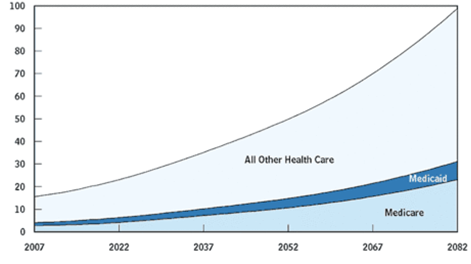Brian Klepper
 The attached PP deck is a presentation I’ve given several times that has received an overwhelmingly positive, if frightened, reception.
The attached PP deck is a presentation I’ve given several times that has received an overwhelmingly positive, if frightened, reception.
It is, perhaps, the most disturbing public argument of my career (which is going some), because it tries to document the health care industry’s “capture” of health care regulatory processes, particularly those that govern payment. The result, as many people understand, is that the health care industry, in its rapaciousness, is effectively driving the larger US economy off a cliff.
Only one group, the non-health care business community, has the heft, influence and motivation to save us, though health care has done a good job dividing and conquering this sector as well, insinuating itself into many of the most powerful institutions (e.g., the Chambers of Commerce). It remains very unclear that the business community can be galvanized/mobilized from its malaise to turn this problem around.
The argument goes like this:
- The data are clear that the US’ health care economy is absorbing most gains in the larger economy, and driving the US economy toward collapse. For example, nearly all increases in total compensation have been directed at increasing health costs, which in turn flows into the health industry.
- Reasonable estimates of health care wasteshow that half or more of all current health care expenditures, or currently about $1.5 trillion each year, provide no value. To put this into perspective, remember that the Congressional Super-Committee sought $1.2 trillion over ten years. (They failed.)
- Americans have come to accept the fact that our health care burden is twice or more that of other developed nations, shrugging it off as though it just turned out that way. But the excessive cost has occurred due to reasons that are very much by design and are understandable.
- The three major structural underpinnings of this excess – fee-for-service reimbursement; a lack of quality, safety and pricing transparency; and the subjugation of primary care – have been tenaciously advanced and protected through two mechanisms of “regulatory capture:” lobbying and the RUC.
- Many of us have come to take for granted health industry practices that are based on influence-peddling and financial conflict. Read the blogs of professionals close to the drug and device industries and it becomes clear that these practices are wide-ranging, from buying lunches for physician practices to funding and writing scholarly articles for researchers.
- In the main, current policy solutions have been diluted by health care interests, and are inadequate to resolve the issue. Some market-based solutions are promising, but they are likely inadequate as well, given the scale of the problem.
- Currently there is little if any organized effort focused on curtailing the health industry’s excesses. This is analogous to willfully refusing to intervene to prevent a cyber-attack that would cripple the US economy.
- Only one group has more size and influence than the health care industry, as well as the motivation to provide the counterweight that can save the American economy: the non-health care business community. So far, this group has appeared disinclined to galvanize and mobilize at a policy level.
- In many ways, the business community has been co-opted by health care. Many large companies – e.g., GE, Westinghouse, Microsoft – have health care product/service lines that keep them from addressing the problem. Many business groups – e.g., Chambers – are dominated by health care. Many business health coalitions receive funding from health care organizations (e.g., drug/device/supply firms), and so don’t want to strike out. This leaves the remaining businesses with no center of power that can be focused on the issue.
I have been haunted by reading Jared Diamond’s Collapse, an important if gloomy book. While some scholars have taken issue with Dr. Diamond’s interpretation of certain historical scenarios – e.g., why the Easter Island culture hit a wall – the deeper message is clear and resonant. Many, many advanced societies have failed because an elite group knowingly promoted and protected practices that undermined sustainability.
I am not at all positive that America has the focus or the will to address this issue, though it strikes at the very heart of our economic viability and future.




Brian,
This is an outstanding and important article. I will re-post this on Cracking Health Costs.
Cheers,
Tom Emerick
A brilliant analysis of America’s healthcare dilemma. The challenge is finding a non-co-opted corporate reformer, since Brian wrote off the majority of major, non-healthcare, corporate players. I think one may appear shortly.
Great thinking! There are far more roadblocks to improving healthcare than just a pay for service model.
I thought that this was an excellent definition of the problem…but all I heard insofar as a solution is concerned is that Industry should solve it. I would like to hear more as to how industry should solve it. Problem definition is essential, but so is th solution. He says who should solve it, but not how.